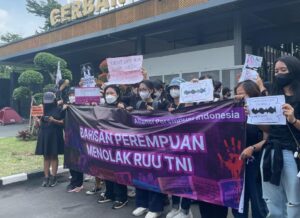“We can still consider postponing the upcoming regional elections; the postponement is by no means a non-existent possibility [amid the COVID-19 pandemic situation],” said Elections Supervisory Body member Fritz Edward Siregar during a virtual discussion organized on Sept. 23 by the University of Indonesia’s (UI) alumni organization.
Fritz’s speech is not without any substance: he was referring to Law No. 6/2020. The regulatory measure, which was signed on May 4 this year said that it was possible to postpone the upcoming regional elections due to the current COVID-19 crisis with the approval of both the General Elections Commission and the House of Representatives.
The Elections Supervisory Body, according to Fritz, actually has the power to recommend partial postponement of the upcoming regional elections upon observing a spike of COVID-19 cases in Indonesia, the government’s sluggish response to the pandemic as well as a low participation rate of candidate pairs.
“We consider recommending the partial postponement of the upcoming regional elections,” he said.
Amid the government’s stubborn insistence to move ahead with the regional elections anyway in December 2020, various organizations have voiced their opposition to the plan. For instance, the Nahdlatul Ulama Islamic mass organization chairman Said Aqil Siroj suggested that the government conducted the simultaneous regional elections only after we safely passed this health emergency situation.
“When you choose to go ahead and organize the regional elections anyway, albeit under much stricter health protocols, you can’t avoid create a dense crowd of individuals on every step of the elections cycle,” Said said on his organization’s official statement made available on Sept. 20.
Meanwhile, the Muhammadiyah Islamic organization headquarters secretary Abdul Mu’ti said that if the government steamrolled their decision to go ahead and organize the upcoming regional elections amid the constraints brought by the recent pandemic, the government, without realizing it, was putting the quality of Indonesia’s democracy at stake.
“For the sake of safeguarding people’s safety while ensuring high-quality elections procedure, the General Elections Commission should seriously consider the option of postponing the upcoming regional elections until our situations get more conducive [from the current COVID-19 pandemic],” Abdul said during a virtual press conference held on Sept. 22.
Various civil society groups have also been calling on the government to postpone the upcoming regional elections in light of the COVID-19 pandemic. These organizations include; the Indonesian Corruption Watch, the Public Education for Voters Network, the Independent Elections Supervisory Committee, the Indonesian Legislative Supervisory Committee, the Report COVID-19, Network for Electoral and Democratic Integrity, Network for Indonesian Democracy, the Association for the Elections and Democracy, the Andalas University’s Constitutional Studies Center, the University of Indonesia’s Political Studies Center, The Civic House, Access for Disabled People to Elections, Partnership for Governance Reform and Transparency International Indonesia.
These organizations have initiated an online petition in change.org demanding that the government postpone the simultaneous regional elections for a full year to the end of 2021. As of Sept. 28, the petition had been signed by about 36,000 accounts.
A civil society coalition representative Wahidah Suaib said she perceived the government behaving arrogantly. The woman, who once served as an Elections Supervisory Body member for the 2008 – 2012 period also said she perceived that the government, House of Representatives and the General Elections Commission were currently putting the lives of so many innocent people at stake.
“Therefore, the government’s decision [to go ahead with the regional elections] has wounded the people’s hearts,” Wahidah said during a virtual press conference conducted on Sept. 22.
Just as a backgrounder, the government plans to organize the 2020 regional elections across 270 regions nationwide. According to the candidacy information system, as many as 698 candidates have been declared eligible to run for office in the upcoming elections.
They comprise 24 pairs of candidates for the gubernatorial elections, along with 674 pairs of candidates for the regency elections, as well as the mayoral elections – which will involve 105 million eligible voters. The pairs of candidates have already started their campaigns cycle starting from Sept. 26 and the cycle will last until Dec. 5. The cooling-off period, meanwhile, will fall from Dec. 6 to 8.
“We need to postpone the regional elections until the government, House of Representatives and elections committee are ready to come up with more detailed and comprehensive regulations to conduct the regional elections amid the pandemic,” said Wahidah. She also suggested that the government prepared a Government Regulation in Lieu of Law (Perppu) regulating the health aspects of the regional elections.
The government has responded coldly to the idea of postponing the regional elections. During a virtual coordination meeting joined by the Home Affairs Minister Tito Karnavian, the General Elections Commission chairman Ilham Saputra, the Elections Supervisory Body Abhan and the Elections Organizer Honorary Council Muhammad Alhamid on Sept. 21, they stated that they would go ahead organizing the regional elections anyway amid the COVID-19 pandemic.
They went on to say that the General Elections Commission would coin further regulations about the elections’ health protocols and social restrictions.
Tito, meanwhile, said during a meeting with the House of Representatives’ commission II overseeing the elections on Sept. 21, that no government official could guarantee that the coronavirus outbreak would end in 2021. Therefore, he said, sooner or later Indonesia will have to organize its regional elections.
Separately contacted, the General Elections Commission’s Depok chapter chairman Nana Shobarna said that before the government issued any decisions to postpone the regional elections, the commission would go ahead and run the elections anyway. According to him, the two candidates pairs from Depok have demonstrated that they will comply with the COVID-19 pandemic-related health protocols. They have also signed an integrity pact declaring they will ensure that they will conduct their campaigns peacefully.
“We’ve coordinated with stakeholders to ensure that our candidates won’t invite a large number of crowds [during their campaigns],” Nana told jaring.id by phone on Sept. 23.
Nana explained that the health procedures that the commission would apply on the upcoming elections on Dec. 9 would entail various measures including: conducting rapid test for all voting officers, disinfecting the voting booths, disseminating single-use face masks and hand gloves to all the voters.
“We will also reduce the capacity of each of our voting booths, which was usually accommodating 800 individuals per booth, to just accommodate 500 individuals per booth to avoid overcrowding,” Nana explained.
The General Elections Commission’s Yogyakarta chapter chairman Hamdan Kurniawan, meanwhile, keeps on warning candidates and voters alike to comply with healthcare protocols that have been set in place, especially during the campaigns cycle.
“We have sent them letters, requesting that they don’t conduct parades involving a large amount of masses,” Hamdan told jaring.id by phone on Sept. 23.
The General Elections Commission’s latest regulation no. 13/2020 has already prohibited meetings or mass activities throughout the elections cycle. Meanwhile, the regulation still allows face-to-face meetings – comprising dialogues and open debates – to happen as long as they are joined by limited amount of people only.
“A more stringent punishment [to ensure compliance] needs to be devised for the people’s own good, not to mention the candidates and voting committee themselves,” he said.
To date, at least 32 officers working for the General Elections Commission’s general secretaiat have been tested positive for COVID-19. These include the commission’s head commissioner Arief Budiman and commissioner Evi Novinda Ginting.
As per Sept. 20, a member of the commission’s provincial branch member, as well as eight commissioners on the regency level, along with 19 members of the commission’s task force and 29 ad hoc body members had also been tested positive for COVID-19.







